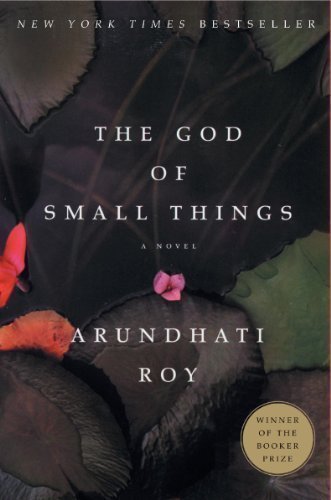“He stared straight ahead with his mortgaged eye. He wept with his own one. 1 cheek glistened with tears. The other stayed dry.”(Ch.2)
I’ve been reading Arundhati Roy’s The God of Small Things.

It’s a well-written book about tragedies in a family in India because of the caste system and such barbaric laws in Indian society. The story is not told chronologically, but in fragments, like memories, or pieces of a puzzle. It draws you in, though sometimes at the beginning it can be irritatingly cryptic, as Arundhati Roy doesn’t want to reveal the tragedy too soon.
But I read more for the prose, the rhythmic prose, and the imagery in the book.
About Estha’s silence, from chapter 1:
“Estha had always been a quiet child, so no one could pinpoint with any degree of accuracy exactly when (the year, if not the month, or day) he had stopped talking. Stopped talking altogether, that is. The fact is that there wasn’t an ‘exactly when’. It had been a gradual wining down and closing shop. A barely noticeable quietening. As though he had simply out of conversation and had nothing left to say. Yet Estha’s silence was never awkward. Never intrusive. Never noisy. It wasn’t an accusing, protesting silence as much as a sort of aestivation, a dormancy, the psychological equivalent of what lungfish do to get themselves through the dry season, except that in Estha’s case the dry season looked as though it would last forever.”The description becomes more extreme:
“Once the quietness arrived, it stayed and spread in Estha. It reached out of his head and enfolded him in his swampy arms. It rocked him to the rhythm of an ancient, foetal heartbeat. It sent its stealthy, suckered tentacles inching along the insides of his skull, hoovering the knolls and dells of his memory, dislodging old sentences, whisking them off the tip of his tongue. It stripped his thoughts of the words that described them and left them pared and naked. Unspeakable. Numb. And to an observer therefore, perhaps barely there. He grew accustomed to the uneasy octopus that lived inside him and squirted its inky tranquilizer on his past. Gradually the reason for his silence was hidden away, entombed somewhere deep in the soothing folds of the fact of it.”Gross. But that’s an interesting image.
“The red has bled away.”It’s hard to say why I like this so much. Or this:
“… Though you couldn’t see the river from the house any more, like a seashell always has a sea-sense, the Ayemenem house still had a river-sense.About Sophie Mol’s death, from chapter 1:
A rushing, rolling, fishswimming sense.”
“Chacko was Mammachi’s only son. Her own grief grieved her. His devastated her.”And later:
“It is curious how sometimes the memory of death lives on for so much longer than the memory of the life that it purloined.”That line resonates, to some extent.
Now look at this choice of words:
“In the cold home on the hill, Baby Kochamma sat at the dining table rubbing the thick, frothy bitterness out of an elderly cucumber.”And this simile from chapter 4—description of a taxi:
“A swathe of dirty yellow sponge spilled out and shivered on the back seat like an immense jaundiced liver.”You get the idea.
I Don't know whether this blog is alive..I read this novel long ago and I loved it so much that everytime I read it felt all-out new. Somehow I found this blog on google and took a look. I am expecting a reply.
ReplyDeleteHello :) The blog is alive. My last blog post was on the 18th of August lol.
Delete